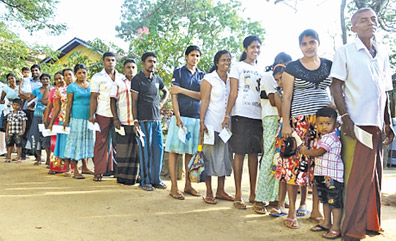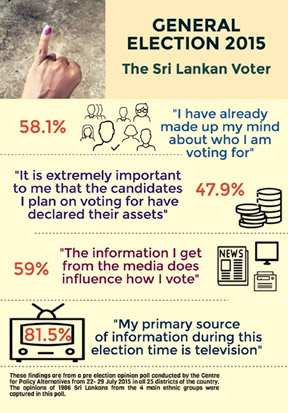|
The new Parliament :
Much unfinished business
by Dr. Pakiasothy Saravanamuttu
Elections are the basic mechanism for choice and change in a
functioning democracy. In Sri Lanka, getting out to vote is more than
just a standard operating procedure - voting has a ritualistic even
festive dimension to it, even though this has, too often, also been
accompanied by nastiness and violence.
 |
|
Pic: AFP |
Tomorrow, August 17, millions of Sri Lankans will vote for the second
time in eight months in what has been called a decisive and historic
election.
This appellation has been accorded to earlier elections and that it
continues to be employed illustrates the nature of our flawed, yet
formal democracy and the constant hope that at every election democracy
will be consolidated and the fears and doubts about its resilience
banished forever. We will know, one way or another, on August 18.
Citizens
A feature of the election in January was that the electorate was
treated primarily as citizens and not in terms of any of the other
multiple identities they profess to. That election was about the
architecture of democracy and governance, transparency and
accountability and these issues in turn were built on a platform of a
certain amount of economic disaffection.
Arguably the major challenge facing the country, of deep and enduring
national unity and reconciliation, a political and constitutional
settlement of the ethnic issue, moving, in short, from post-war to
post-conflict, was placed on the back burner.
This was, ostensibly, on the grounds that first and foremost an
enabling environment of democratic governance was necessary to address
this challenge.
That things did not work out entirely as premised and promised,
leaves us with unfinished business on August 17. Hence, the particular
importance of this general election. A consequence of the treatment of
the electorate as citizens is attested to by a greater sense of
empowerment on their part and faith and trust in the integrity of the
electoral process.
Freedom
 A survey conducted islandwide by Social Indicator, the polling arm of
the Centre for Policy Alternatives (CPA), in the last two weeks of July
found that 67 per cent of the electorate believe that the election will
be free and fair - in January this figure was 40.3 per cent, with
another 21.3 per cent believing that it 'could be free and fair'. A survey conducted islandwide by Social Indicator, the polling arm of
the Centre for Policy Alternatives (CPA), in the last two weeks of July
found that 67 per cent of the electorate believe that the election will
be free and fair - in January this figure was 40.3 per cent, with
another 21.3 per cent believing that it 'could be free and fair'.
In January some 13 per cent of people surveyed by Social Indicator
were of the belief that the election 'definitely' would not be free and
fair.
A second opinion survey at the end of July found that only 4 per cent
still held that view. In January 87 per cent believed their vote would
make a difference, with 48 per cent strongly of this belief.
There is a general consensus amongst monitoring organizations that
the environment in which this election is being conducted is freer and
fairer than recent elections and in particular that there is a greater
willingness on the part of the citizenry to express their political
opinion and the freedom to do so.
Whilst there have been incidents of violence, three murders in
particular and reports about the involvement of the underworld and drug
mafia in politics, by and large the nature and intensity of incidents
recorded are lower than in previous elections.
New era
This holds too for the misuse and abuse of state resources. The
Elections Commissioner and the Police have the space to do their job as
intended and have availed themselves of it in respect of adherence to
election laws.
Therefore, despite the life or death nature, literally and
metaphorically in some cases, of the political contests, they have so
far been contained within bounds of lower levels of violence than
before.
Does this mean that the country is on the cusp of a new era of
politics, political culture, governance and government? Perhaps.
The point to remember though, whatever the result of August 17 is
that all of this is part of a process from which there is no break.
All of this is always in a state of becoming rather than one of
being. The price of democracy is the perpetual vigilance of citizens -
no let up is the best insurance for no let down.
Next Parliament
Certainly, it is the case that the next parliament will have to deal
with a raft of challenges - from accountability in terms of financial
corruption to debt and a bloated public service; from demands for
accountability that will ensue from the Geneva report to a political and
constitutional settlement of the ethnic conflict.
The durability and resilience of any governance framework will be
sorely tested.
All of this will require skillful, sensitive political management and
a sound working relationship between President Maithripala Sirisena and
Prime Minister Ranil Wickremesinghe - a political partnership not merely
in name.
It does not have to be back to the future or another lost
opportunity. And we have the power to decide.... . |

